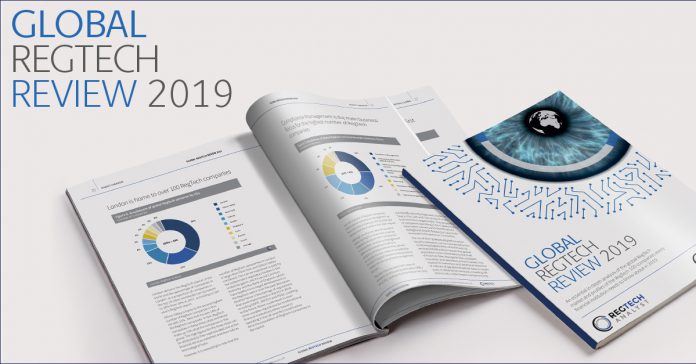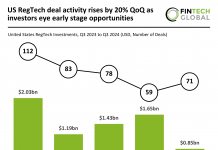The global market size of the RegTech space is expected to reach a colossal $128bn by 2023, according to the newly released second annual RegTech Review.
This year’s RegTech Review has now been released and it features analysis of the global RegTech sector. One section of the Review is a detailed information and analysis of the companies to feature in this year’s RegTech 100, which was revealed last month. A new feature to be included in the report for 2018, is a study of compliance professionals and how they see the current regulatory environment.
One of the findings from the report is that RegTech companies are expecting the market to be worth $127.6bn by 2023, in terms of annual revenue spent on regulatory software and related services. This staggering sum does not even account for expenditure on consulting, advisory or compliance services.
With such a high estimate, it highlights the level of opportunities available for businesses and potential rates of return for investors. This is clearly not being ignored by entrepreneurs, as there are now more than 800 RegTech companies in the world which are building solutions for compliance, risk management or cybersecurity.
Investors are also not letting the chance slip past them, with global investment into RegTech companies having increased by 4.5-times between 2013 and 2017. This growth is showing no signs of stopping, with double the volume of capital being deployed in just the first three quarters of 2018, compared with the entirety of 2017. There has been $3.8bn to be invested into the market over the course of the first three quarters of 2018, which has been driven by a number of high-valued deals in Asia.
As to be expected with the RegTech market maturing, the size of the deals has been increasing. Compared with the size of deals in 2013, transactions valued over $10m have tripled to 47 per cent of all transactions during the first nine months of 2018.
Financial institutions are also getting stuck in with the market through partnerships, but also via investing. Barclays, Goldman Sachs and American Express, were among the top investors over the past 12 months.
In October, Goldman Sachs participated in the $57.5m Series B round of BitGO, which provides institutional investors with security, compliance and custodial solutions for blockchain-based currencies. Shortly before this deal, the bank contributed to the $80m investment of Sonatype. The company delivers real-time remediation guidance to automate and scale open source governance for software developers.
Barclays, on the other hand, recently invested into the $67m round of compliant communication platform Symphony. The company enables financial services to communicate with internal and external teams in a secure and compliant system, as well as sharing documents safely.
Also getting in on the investing action this year was American Express, with it taking part in the $100m Series D of fraud prevention software developer Signifyd. Not only have these three financial institutions been very active on the investment side of things, but they have also made numerous partnerships as well.
In a recent interview with RegTech Analyst, Maria Leistner group managing director and general counsel global wealth management at UBS, said that financial institutions are only interested in RegTech companies which have the content to back up their technology. She said that partnering and working with RegTechs is the best route for financial institutions, as its too hard to develop disruptive solutions internally, especially for larger institutions. The trouble is, there are many companies out there which have only got the gimmick of technology, and no real content to supplement it.
Leistner said, “Sometimes they offer the technologic solutions, but without the content necessarily. They have started to realise that this perhaps is a weakness because financial institutions would be ideally interested in both. They are teaming up now with other players, be that consultancies or advisors, in order to provide the technology plus the content. Obviously, the financial institutions are interested in both, and only want a solution that gives you the whole package, otherwise we can often develop the technology solutions ourselves.”
Compliance professional perspective
New to this year’s RegTech Review was a survey of compliance professionals from financial institutions. From their responses, it was made clear that MiFID II and GDPR are the most challenging regulations to comply with. Following these, KYC was the hardest regulation.
Both MiFID II and GDPR came into force earlier this year and only four months between one another. Making things tougher, these regulations both required a drastic change in the operations and compliance of institutions. There has been an unprecedented level of new regulations being introduced to the market, making it harder for financial institutions to keep up with changes, especially if they wish to do everything in-house.
This high level of change is not being welcomed with open arms, Axioma managing director and head of risk solutions Ian Lumb believes. He said that some compliance leaders are looking at the level of regulation as a “massive headache” and not as an opportunity but “just layers of costs on top of the business.” The main reason for this is because they are not optional but are compulsory and do not always make sense.
He added, “Case in point: days-to-trade in fixed income is a tenuous concept in a principal market that is not exchange traded. Regulators are asking for things that are not necessarily easy to deliver or natural concepts, and that makes all this even harder.”
While compliance professionals might be seeing struggles with these regulations, RegTech companies have clearly acknowledged their worry. Of the 819 RegTech companies currently in the market, 270 of these provide solutions addressing KYC challenges. In addition, 178 vendors offer products to combat GDPR rules and 154 utilise technology for MiFID II.
Financial institutions are noticing this and are partnering with various solutions to aid compliance burdens. A recent example is the collaboration between Barclays and Simudyne, which is aimed at helping the bank with its predictive capabilities for risk management. The company will conduct agent-based modelling simulations to create a mock-up of networks like the financial markets.
For the full RegTech Review visit the Global RegTech Review website











